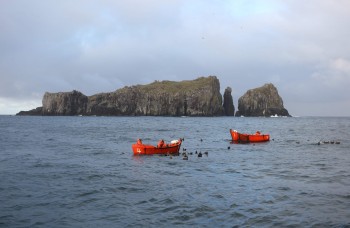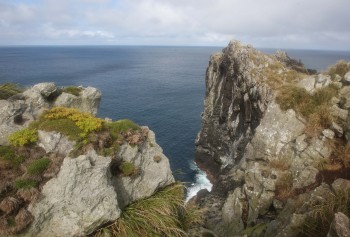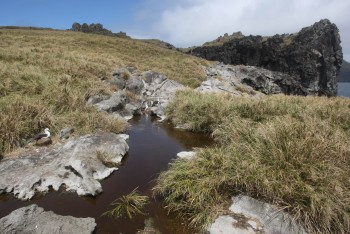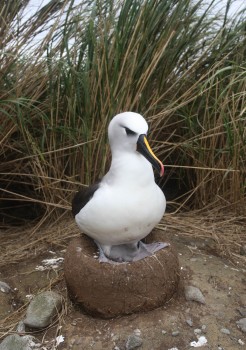Middle and Stoltenhoff Islands lie off Nightingale Island in the South Atlantic. They form part of the United Kingdom’s Overseas Territory of St Helena, Ascension and Tristan da Cunha.
“Middle Island (approximately 10 ha) is a fairly low lying island located 250 m north of Nightingale, whereas Stoltenhoff Island (approximately 8 ha), 700 m northwest of Middle Island, is taller with 70 m cliffs around much of its coastline. There are two stacks at the eastern end of Stoltenhoff, the larger of which (0.8 ha) is capped in vegetation” (click here).

Middle (right) and Stoltenhoff (behind and to the left) Islands viewed from Nightingale Island

Stoltenhoff Island and its two stacks with crayfishing boats

Stoltenhoff Island is partially obscured by Middle Island
Photograph by John Cooper
The two islands have been only rarely visited by scientists, with the last ornithological survey of both islands being undertaken in December 2009, following earlier published landings in 1974.

Stoltenhoff's steep cliffs support a few pairs of Sooty Albatrosses

The western side of Stoltenhoff showing its Tussock Spartina arundinacea covering
In 2009 ACAP-listed and Endangered Atlantic Yellow-nosed Albatrosses Thalassarche chlororhynchos were recorded breeding on both islands (40 pairs on Middle and 210 on Stoltenhoff). However, Endangered Sooty Albatrosses Phoebetria fusca were only recorded breeding on Stoltenhoff (six pairs). Breeding numbers of both species have declined since the 1974 survey (click here).

An Atlantic Yellow-nosed Albatross broods its small chick on Middle Island
All photographs by Peter Ryan unless stated
Great Shearwaters Puffinus gravis and at least some other burrow-nesting petrels breed in numbers on both islands but Northern Rockhopper Penguins Eudyptes moseleyi breed only on more-accessible Middle Island.
The two islands (along with Nightingale) currently have no formal nature reserve status. Because they are nearly free of introduced plants (unlike Nightingale for which eight alien species have been recorded) and because they are rarely visited they are considered to be “among the least modified habitats at Tristan”. Strict biosecurity protocols are therefore required prior to landings – which are only allowed with permission from the Tristan Conservation Department.
With thanks to Peter Ryan for the photographs and for reviewing the text.
Selected References:
Sommer, E., Cuthbert, R. & Hilton, G. 2008. Tristan and Nightingale Islands Wildlife Monitoring Manual Research Report. RSPB Research Report 33: 1-36.
Ryan, P.G. (Ed.) 2007. Field Guide to the Animals and Plants of Tristan da Cunha and Gough Island. Newbury: Pisces Publications. 162 pp.
Ryan, P.G. 2008. Important Bird Areas: Tristan da Cunha and Gough Island. British Birds 101: 586-606.
Richardson, M.E. 1984. Aspects of the ornithology of the Tristan da Cunha group and Gough Island, 1972-1974. Cormorant 12: 123-201.
Rosenthal, E. 1952. Shelter from the Spray. Cape Town: Howard B. Timmins. 212 pp.
Ryan, P.G., Glass, N. & Ronconi, R.A. 2011. The plants and birds of Stoltenhoff and Middle Islands, Tristan da Cunha. Polar Record 47: 86-90.
Tristan Island Government 2006. Tristan da Cunha Biodiversity Action Plan. 53 pp. + 10 annexes.
Wolfaardt, A.C., Glass, J. & Glass, T. 2009. Tristan da Cunha Implementation Plan for the Agreement on the Conservation of Albatrosses and Petrels (ACAP): Review of Current Work and a Prioritised Work Programme for the Future. Edinburgh, Tristan da Cunha: Tristan da Cunha Government. 46 pp.
John Cooper, ACAP Information Officer, 14 December 2013

 English
English  Français
Français  Español
Español